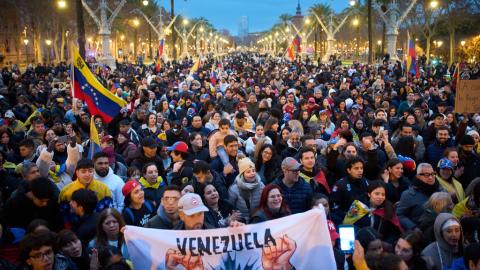From America's Conscience to Caring for Souls: Christian Leaders Look to the Black Church for Renewal and Unity
WASHINGTON – In the middle of a sharply-divided era—along social, political, and racial lines—some evangelical Christian leaders believe a key to solving the yawning divide can be found in the example of the Black church.
As difficult as it may be to underscore the significance religion has played in shaping the nation's laws, policies, and identity, so, too, they contend, are the contributions of Black pastors and their flock on American history and culture.
It's a sentiment summed up by popular evangelical Pastor Tony Evans, featured in a promotional video for the Museum of the Bible.
"You can't study American history, American culture, American life, American entertainment, American religion—you cannot talk about America and not talk about the Black church," Evans exhorted in a video listed as the official trailer for the "Blessing of the Elders."
Blessing of the Elders – A Movement
In the wake of the spring 2020 national reckoning on race, some Christian leaders started wading more deliberately into the challenging issue, sensing a calling to seek a spiritual solution to a generations-old sinful problem.
One of them was Jon Sharpe, a senior official with the Museum of the Bible – a popular destination for evangelicals visiting the nation's capital.
Sharpe teamed up with Black pastors to create an initiative called the Blessing of the Elders to honor the history and impact of the Black church along with its spiritual leaders.
According to its website, the museum's collaborative coalition desires "to give honor where honor is overdue" and recognize the "vitally important exceptional contribution" of the Black church "to the development of America's biblical values."
The initiative evolved into a movement, garnering supporters in a dozen cities, and culminated with a recent star-studded ceremony.
Torch-Passing Trailblazers
The eponymous ceremony in late June honored seven pastors and leaders hailing from different regions and Christian traditions. They included Bishop T.D. Jakes of the Potter's House in Dallas; legendary gospel recording artist Shirley Caesar, who also pastors a church in Raleigh, NC; John Perkins, a civil rights icon; Bishop Charles Blake of the West Angeles Church of God in Christ; A.R. Bernard, pastor of Christian Cultural Center in Brooklyn, NY; Vashti Murphy McKenzie, former bishop of the African Methodist Episcopal Church; and Pastor Evans of Oak Cliff Bible Fellowship near Dallas.
Scores of supporters who were dressed in gowns and tuxes helped to transform the stately museum into a red carpet gala.
"I'm standing in a building that represents the Lord — that represents the Word of God, and so I feel like I'm being represented, too," Caesar, pastor of Mt. Calvary Word of Faith Church, told CBN News.
Other attendees included actor Denzel Washington and his wife, Pauletta—who served as award presenters—and government officials like Robert Contee, chief of the Washington, D.C. Metropolitan Police Department and Virginia Gov. Glenn Youngkin and Lt. Gov. Winsome Sears. Youngkin and his wife, Suzanne, supported the initiative financially through their charitable organization, Phos.
The evening also featured gospel music performances by Fred Hammond, Lecrae, the Clark Sisters, Marvin Winans, as well as Erica Campbell and Bebe Winans, who played double duty serving as the ceremony's emcees.
The event was also symbolic of the "passing the baton" from the church elders to the next wave of preachers and teachers.
Historic Roots, Hopeful Future
In his acceptance speech, Bernard highlighted the Black church's roots in slavery and its evolution as an institution born out of the system of segregation – a time when literal walls separated worship between fellow believers and was enforced by law.
"We did not mimic the white Christian church in America. We actually created a parallel with our own identity, our own hymns, our own style of preaching and worship that was initially rooted in our slave experience," Bernard told CBN News before the ceremony. "So it became central to the Black community. It preserved Black history and Black tradition."
Historically, the Black church served as a catalyst for African Americans to experience a sense of dignity and self-worth not afforded to them by society at large. It also would become a haven to form community and an incubator for social activism.
More recently during the pandemic, it lent its credibility as a partner in public health by setting up clinics in Black neighborhoods.
Another issue at the top of its list is confronting rising crime – a subject Bishop McKenzie addressed after receiving her award. She urged Christians to be bold and bound in unity.
"Stand firm in the Gospel of Jesus Christ, even though God will send you to hostile places," said McKenzie, who served as her denomination's first female bishop and now leads the National Council of Churches. She recounted a conversation she had with a city official who warned of potential repercussions for taking her stand against drugs and violence.
"Stand firm: even as a pastor creating a take back the streets campaign because we were tired of the drug dealers ruling in our neighborhood. And the mayor picks up the phone and says, 'McKenzie, be careful,' she told the audience who repeated her call and response stanza, echoing in unison: "Stand firm."
From music and entertainment, to fashion, to familiar church expressions and the way people gather and celebrate, traces of the Black church's influence can be seen and felt throughout American culture, crisscrossing past the barrier of traditional color lines.
Organizers and historians note how the institution served as "the conscience of America" during the Civil Rights movement. More recently, Black churchgoers strikingly modeled reconciliation in the wake of tragedies like the massacre at Mother Emanuel AME Church in Charleston, SC — where the families of the victims memorably forgave the shooter.
"I think that the Black church is poised to really be the bridge builder in a very divided nation," declared Bernard, the Brooklyn-based pastor.
Supporters point to these and other examples as important ways to study and emulate how believers can wage the "good fight of faith" full of integrity and virtue without compromising the credibility of their Christian witness.
They also believe it provides an on-ramp to becoming one, unified church—walking in love and reconciliation and promoting the good news to heal a divided country and a broken world.
"When we can come together and say that God teaches us that we are all equally loved, valued, and appreciated by our Creator God," posited Steve Green, co-founder and board chairman of the Museum of the Bible, "then it helps us come together and unify and serve the one God that we all love."




